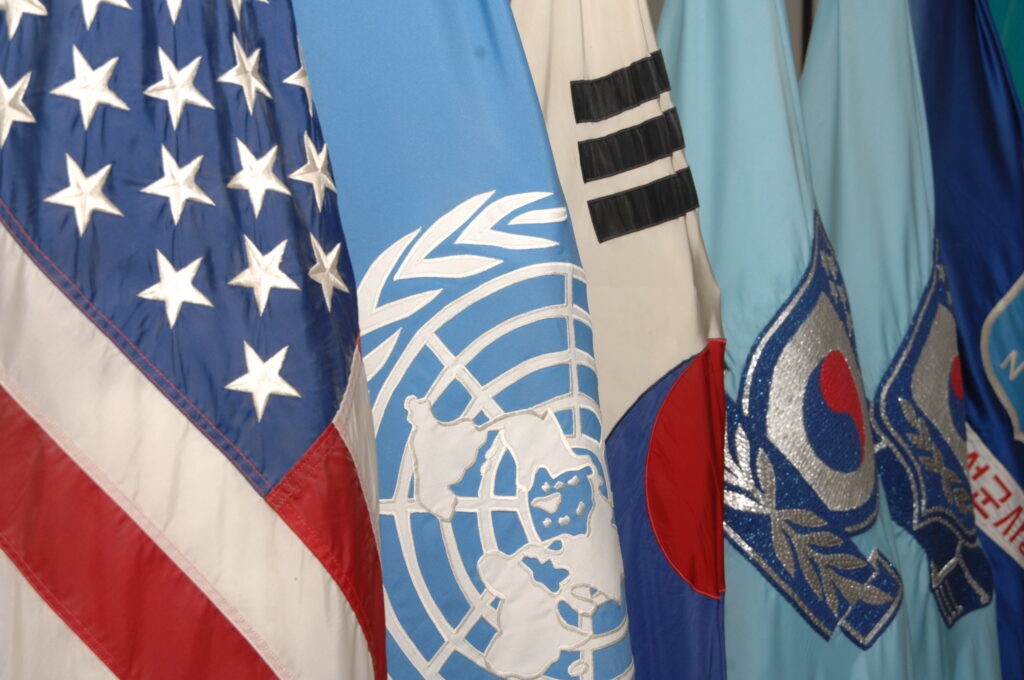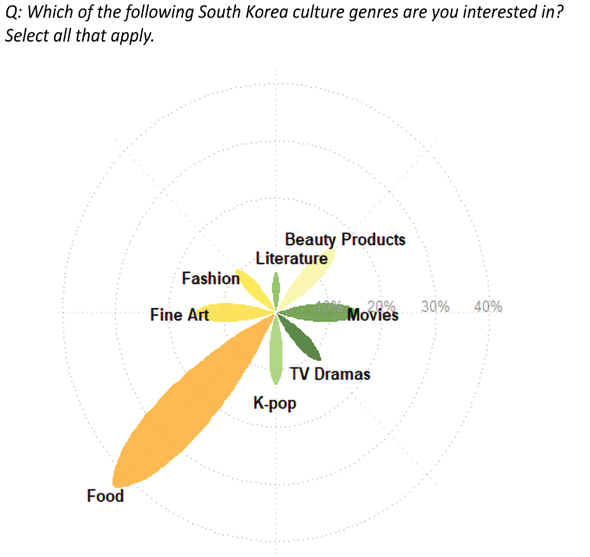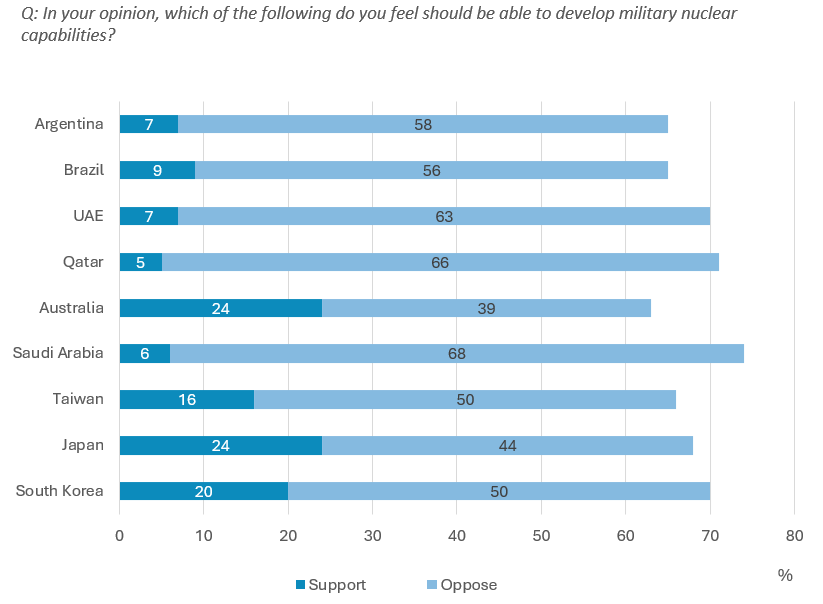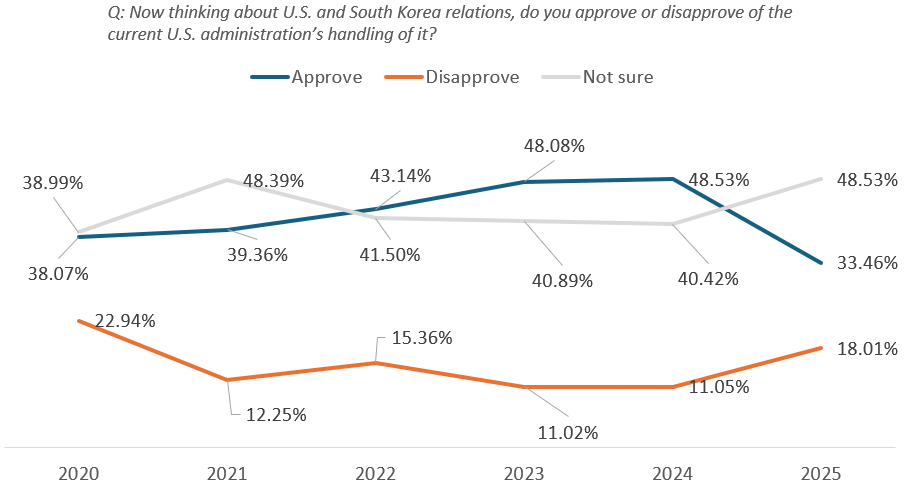The Peninsula
Public Opinion and the Future of the U.S.–South Korea Alliance

The following is an executive summary of a report from the Korea Economic Institute of America and YouGov titled “American Public Attitudes on U.S. Foreign Policy in Northeast Asia and the Korean Peninsula, 2025, published Friday, Oct. 3, 2025. Read the full report by clicking here.
This year’s KEI/YouGov survey comes at a moment of profound uncertainty in U.S. foreign policy. The Donald Trump administration has unsettled established trade arrangements, raised questions about the durability of U.S. alliance commitments, and injected unpredictability into U.S. engagement with long-standing partners like South Korea.
Against this backdrop, American public opinion provides a clearer sense of continuity. The survey reveals enduring support for South Korea as a partner, stable recognition of the alliance’s value, and consistent preference for more open trade, investment, and cultural exchange, even as geopolitical turbulence and partisan divides complicate policymaking. Yet there are signs that American public opinion may be undergoing a transition in how Americans view other countries suggesting possible shifts in global alignments. Finally, within this evolving perception, the type of state appears to matter: Americans tend to weigh national security, trade, and investment differently depending on whether a country is viewed as an ally, partner, competitor, or adversary.
There are several key findings from this year’s survey:
- Global Influence: Americans continue to view the United States as the most influential global actor, with 68 percent describing it as “very influential,” a slight decline from 72 percent last year.
- Foreign Policy Challenges and Threats: Americans rated Russia (66 percent) and China (64 percent) as the most critical foreign policy challenges, followed by Israel (40 percent), North Korea (35 percent), and Iran (27 percent).
- Partners vs. Adversaries: There is growing ambiguity in how Americans categorize allies and adversaries, as the partner-adversary gap has narrowed by 13.5 points since 2020.
- South Korea’s Favorability and Soft Power: Attitudes toward South Korea remain stable and positive, with 66 percent viewing it favorably (six-year average: 68 percent). Soft power plays an important role, as 60 percent of respondents say that South Korean culture improves the country’s image in the United States.

- South Korea Alliance and Security: Public support for the alliance remains strong. Notably, 63 percent say it serves U.S. national security, and about 60 percent support maintaining or increasing current U.S. troop levels. Even if North Korea denuclearized, nearly half (46 percent) would still favor maintaining or increasing troops.
- Taiwan vs. Korea Contingencies: A plurality (47 percent) say the United States should defend both South Korea and Taiwan in the event of a contingency. If forced to choose, more Americans prioritized South Korea (24 percent) over Taiwan (14 percent).
- Nuclear Weapons: Americans oppose South Korea developing its own nuclear arsenal—only 20 percent support the idea, while 50 percent oppose it.

- Trade, Tariffs, and Investment: A strong majority (68 percent) say trade with South Korea is beneficial to the United States; only 10 percent support raising tariffs on South Korean goods. Investments from allies such as Japan (71 percent), Germany (70 percent), and South Korea (62 percent) are viewed positively.
- Defense Industrial Cooperation: A majority (56 percent) favor closer cooperation with allies such as South Korea and Japan in defense supply chains, though 30 percent argue for stricter limits on defense technology sharing.
- North Korea: Perceptions toward North Korea remain deeply negative, with just 11.6 percent of respondents holding favorable views. Strong majorities emphasized the importance of denuclearization (87 percent), human rights (85 percent), and humanitarian aid (54 percent).
- Assessment of Trump Administration Policies Toward South Korea: Approval of the U.S. administration’s handling of Korea policy is at a record low (33 percent approve, 49 percent unsure). Looking forward, Americans want cooperation to focus on technology (50 percent), supply chains (48 percent), and trade rules (39 percent).

KEI’s survey shows that Americans continue to view their country as the most influential global actor, though perceptions of U.S. power have softened slightly in recent years. China is perceived as the second-most important or very influential state, with Japan and South Korea forming part of a stable second tier of influential states. At the same time, the distinction between allies and adversaries appears to be eroding. Since 2020, Americans have grown less certain in categorizing countries like Mexico, India, and China, reflecting an administration that has blurred traditional friend-foe lines through its rhetoric and actions. Yet even in this shifting landscape, South Korea’s position is remarkably consistent. Two-thirds of Americans maintain a favorable view of the country, and cultural exposure—through food, films, music, and travel—continues to deepen goodwill.
Support for the U.S.-South Korea alliance is one of the survey’s most striking constants. Roughly 63 percent of Americans affirm that the alliance advances U.S. national security, and about 60 percent favor keeping or increasing U.S. troop levels on the Korean Peninsula. Even if North Korea were to denuclearize, nearly half expressed a desire to maintain or strengthen the U.S. presence. These responses indicate that the American public views the alliance not only as a hedge against North Korea but also as a stabilizing arrangement with significant regional implications. When asked about defending South Korea and Taiwan in a contingency, nearly half of the respondents favored defending both. Among those who chose only one, South Korea consistently outranked Taiwan. On nuclear weapons, however, the public draws a clear redline. Americans overwhelmingly oppose South Korea developing its own nuclear arsenal, reinforcing their confidence in U.S. extended deterrence.
Economic issues are another domain of resilience. Nearly 68 percent of Americans believe trade with South Korea benefits the United States, and only one in ten supports higher tariffs on South Korean goods—an important counterweight to the Trump administration’s protectionist impulses. Foreign direct investment (FDI) from allies such as Japan, Germany, and South Korea is viewed positively, while investment from China is met with skepticism. On defense industrial cooperation, a majority favors closer supply-chain integration with allies, though concerns about technology transfer persist. These attitudes point to a nuanced public consensus—openness is welcome but must be paired with safeguards that protect U.S. technological advantages and national security.
When it comes to North Korea, Americans remain as wary as ever. Only about 12 percent view North Korea favorably, while large majorities continue to prioritize denuclearization, human rights, and humanitarian assistance. Yet, approval of the U.S. government’s handling of North Korea policy has sunk to a record low at 33 percent, driven less by outright opposition than by uncertainty as nearly half of Americans say they are “not sure.” This ambivalence underscores the lack of consistency and certainty in Washington and the degree to which sudden policy shifts and surprises have eroded public confidence.
Looking ahead, the survey offers a roadmap for constructive U.S.-South Korea cooperation that is firmly aligned with American public sentiment. Americans want the two countries to focus on economic security (i.e., technology, supply chains, and trade rules) alongside security priorities tied to China and North Korea. Human rights, global health, and climate change are also considered important areas of collaboration, although less central. These preferences suggest that even as the U.S. government lurches between protectionism and unpredictability, the American public remains the steady hand for policies that reinforce alliance stability, deepen economic integration, and position South Korea as a key partner in the Indo-Pacific region.
This year’s survey illustrates a paradox. On the one hand, public approval of the Trump administration’s handling of South Korea is at its lowest point in years, reflecting confusion about tariffs, inconsistent messaging, and diplomatic missteps. On the other hand, public support for the alliance, trade, investment, and cultural exchange with South Korea remains deeply entrenched. For policymakers in Washington and Seoul, the lesson is clear. Beneath the noise of a volatile administration, the American public continues to support a strong, resilient partnership with South Korea. Harnessing that support by aligning alliance policy with public priorities, communicating its value to U.S. prosperity and security, and reinforcing shared democratic interests will be essential to navigating the uncertainties of the present moment.
Dr. Je Heon (James) Kim is the Director of Public Opinion and External Relations at KEI. The views expressed here are the authors’ alone.
Photo from U.S. Forces Korea.
KEI is registered under the FARA as an agent of the Korea Institute for International Economic Policy, a public corporation established by the government of the Republic of Korea. Additional information is available at the Department of Justice, Washington, D.C.
